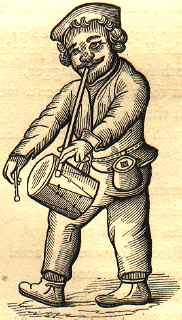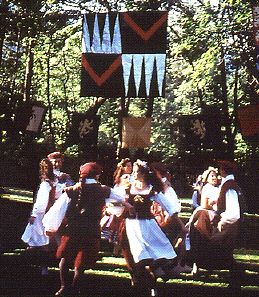Music of the streets and fairs
Street musicians, from the bass violist to the player of the tabor and pipe illustrated here, frequented markets and busy areas, much as street buskers do today. There were many broadside ballads and songs published in the period, and there were of course traditional folk songs*, drinking songs*, and dances.
A picture of Elizabethan dance*.
In The Winter's Tale, Autolycus, in his role as pedlar, sells several ballads* on sensational topics to the gullible shepherds--who forthwith sing one of them. (Click here for an example* of a ballad.)
The markets were alive with music of a different kind, the cries of all those who had wares to sell. Orlando Gibbons took the equivalent of a Renaissance tape recording of the market in a piece that is made up of the cries.*
Go to a discussion of the taverns and their music.
Footnotes
-
A song with staying power
A well-known example of a traditional folk song is "Greensleeves," which Shakespeare mentions twice in The Merry Wives of Windsor.
-
Musical drinking
Many tavern songs were "catches," or rounds, often with a bawdy meaning hidden in the third or fourth part where it would be difficult to hear. An example given here is by Thomas Ravenscroft, and was published in 1611--"He That Will an Alehouse Keep."
Click to hear a rendition of this song:
-
Still dancing
The "village green" here is in Ashland, Oregon, where the Green Show created by the Oregon Shakespeare Festival recreates the dance and music of Shakespeare's time.
Click here to go to the section on country fairs.
-
Autolycus the balladeer
Clown: What hast here? Ballads?
Mopsa: Pray now, buy some. I love a ballad in print, a-life, for then we are sure they are true.
Autolycus: Here's one to a very doleful tune, how a usurer's wife was brought to bed of [gave birth to] twenty money bags at a burden, and how she longed to eat adders' heads and toads carbonadoed [barbecued].
Mopsa: Is it true, think you?
Autolycus: Very true, and but a month old. . . .
Here's another ballad, of a fish that appeared upon the coast on Wednesday the fourscore [80th!] of April, forty thousand fathoms [240,000 feet, 73,000 metres] above water, and sung this ballad against the hard hearts of maids; it was thought she was a woman, and was turned into a cold fish for she would not exchange flesh with one that loved her. The ballad is very pitiful, and as true.
(The Winter's Tale, 4.4.259-81)Shakespeare was hardly exaggerating the contents of contemporary ballads.
-
"Room for Company"
In the section of this siteCD-ROM on trades, a ballad which describes the people who frequent the famous Bartholomew Fair is quoted.
Listen to the ballad:
-
Sounds of the streets
The music...
God give you good morrow my master, past three o'clock and a fair morning. New mussels, new lily white mussels. Hot codlings [cooking apples], hot. New cockles, new great cockles. New great sprats, new. New fresh herrings. New haddocks, new. Now thornbacks new. Hot apple pies, hot. Hot pippin pies, hot. Fine pomegranates, fine. Hot mutton pies hot. Ha' ye any old bellows or trays to mend? Rosemary and bays, quick and gentle. Ripe chestnuts, ripe. Ripe smallnuts, ripe. White cabbage, white young cabbage, white. White turnips, white young turnips, white. . . parsnips. . . lettuce. . . Buy any ink, will you buy any ink, very fine writing ink, will you buy any ink? Ha' ye any rats or mice to kill? I ha' ripe peascods, ripe. Oysters, oysters, oysters, threepence a peck at Bridewell dock, new Wallfleet oysters. Oyez! If any man or woman can tell any tidings of a grey mare, with a long mane and a short tail, she halts [limps] down right before, and is stark lame behind, and was lost this thirtieth day of February. He that can tell any tidings of her, let him come to the Crier, and he shall have well for his hire. Ripe damsons, ripe fine damsons. Hard garlic, hard. Will ye buy any aqua vitae, mistress? I have ripe goose-berries, ripe. Buy a barrel of Samphire. What is't ye lack? Fine wrought shirts or smocks. Perfumed waistcoats, fine bone lace or edgings, sweet gloves, silk garters, very fine silk garters, fine combs or glasses. Or a poking stick with a silver handle. Old doublets, ha'ye any old doublets? Ha' ye any corns on your feet or toes? Fine potatoes, fine. Will ye buy any starch for a clear complexion, mistress? Poor naked bedlam, Tom's a-cold, a small cut of thy bacon or a piece of thy sow's side, good Bess. God Almighty bless thy wits. Quick [live], periwinckles, quick, quick, quick. Buy a new almanac. Buy a fine washing ball. Buy any small coal? Good gracious people, for the Lord's sake, pity the poor women, we lie cold and comfortless night and day on the cold boards in the dark dungeon in great misery. Hot oat cakes. Lanthorn and candlelight, hang out maids for all night. And so we make an end.

